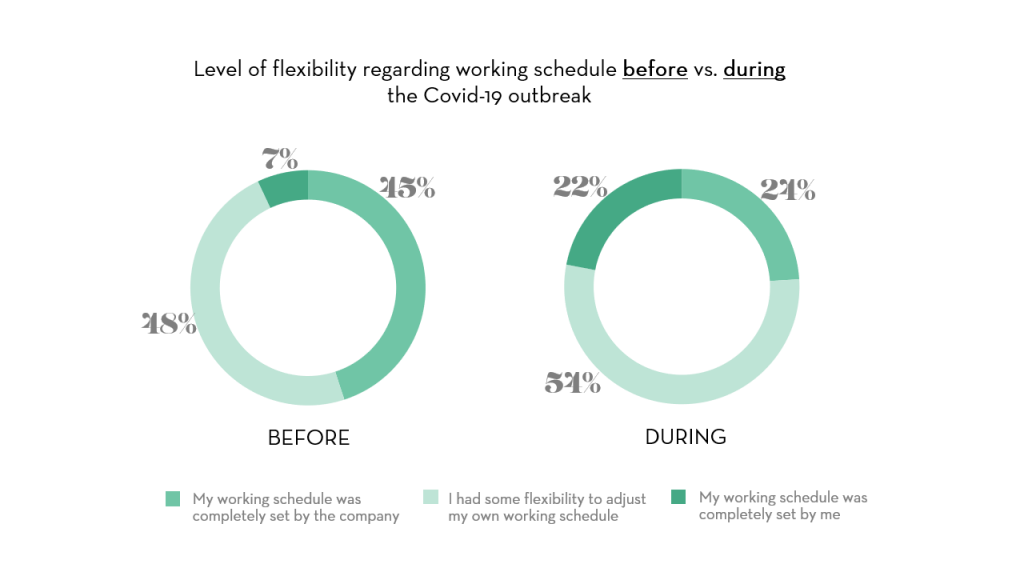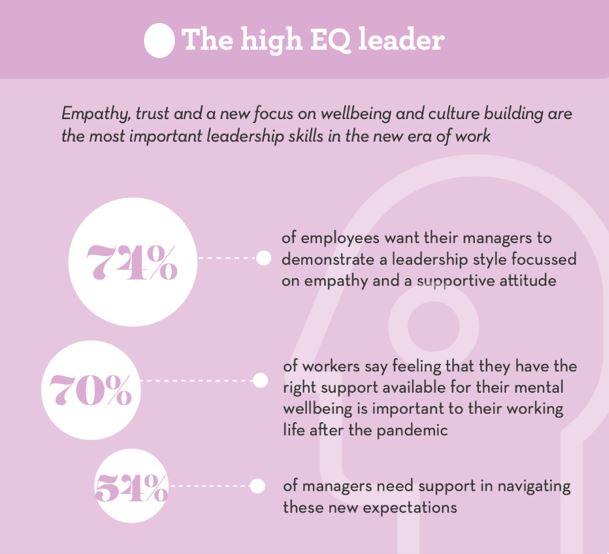The pre-pandemic world of work was known for its transactional and transformational leadership. Successful CEOs provided their staff with the right resources, tools, and incentives to help their company thrive and grow. Bosses needed to have all the answers, they were often in ‘command and control’ mode, they travelled around the world to meet and greet employees and customers and regularly got together with their own leadership team to agree on top-down strategies for the company.
But times have changed. Our workplaces, the style of leadership, and the way we do business have undergone a fundamental reset following the cataclysmic effects of Coronavirus and the resulting uncertainty that affects many businesses.
The future of work is flexible. To make it happen, however, we’ll need Emotional Intelligence
The pandemic being a new situation, many company leaders are poorly equipped to deal with the demands this new era of work makes on them as people and on their character. While leaders of the future will still require the ‘traditional’ leadership skills, competence and experience that brought them to the top of their companies, they’ll also need a greater degree of Emotional Intelligence (EQ), if they are to build trust among their teams and nurture and motivate them.
While EQ is not a new concept and many talented leaders would have already applied it in their role, its usefulness and necessity have become all the more important with the advent of the COVID pandemic. Coronavirus has therefore shunned a harsh light on leadership shortfalls and where leaders need to improve.
But why does leadership need an update? According to our global research published in June, the future of work will be flexible. Three in four employees would appreciate more flexibility and a mix of office-based and remote working going forward and 75% of them say it is important for companies to retain their newly acquired flexibility and autonomy.


Thus, it comes as no surprise that nearly three-quarters of employees want their leaders to show greater empathy and a supportive attitude, while more than half of leaders and managers say they need support in navigating and meeting these new expectations.
What is Emotional Intelligence and how can we develop it?
So how can we meet these expectations? How can companies help leaders develop soft skills and Emotional Intelligence in particular?
An important first step is to understand what EQ is. EQ is the ability to control and channel emotions, build stronger relationships, optimize positive behaviour in stressful situations and to develop the ability to tap into positive, self-driving emotions (e.g. confidence and enthusiasm) which then lead to beneficial outcomes. EQ will help leaders give and receive valuable feedback. EQ will become increasingly important in the post-COVID era as our work becomes more flexible, sometimes more remote and almost certainly more ambiguous.
EQ can and should be taught and developed, just as traditional ‘hard’ leadership skills are taught and nurtured. Businesses should help leaders and managers discover and understand their EQ qualities and, if they do not come naturally, help them train these qualities so that they can lead with empathy. EQ is very difficult to master on an individual ‘self-study’ basis, therefore, a company’s leadership development approach should include some or all of the following:
💡 Make sure you carefully assess your existing workforce to understand the current EQ profile of your leadership population;
💡 Facilitate self-awareness. Sharing the results of an EQ assessment can be the first step towards helping a leader see where there are areas for development. Getting feedback from their bosses and peers is essential and should form input to any post-assessment development plan;
💡 Add an EQ element to any existing 360° process for leaders and high-potential managers. Eliciting feedback from team members can be highly enlightening, but just be aware that teams with a ‘low EQ leader’ may (as a byproduct of this) not feel they can speak up and give honest feedback;
💡 Coaching. Equipped with the output of any leadership or EQ-specific assessments, utilise the power of a coach. Coaching is one of the most powerful and effective ways to increase a leader’s EQ. Over time the coach can support the leader to try out new approaches and take corrective action where needed;
💡 Targeted leadership development. Add an EQ element (or as a ‘red thread’) to all existing leadership development programmes the company offers its aspiring leaders and high potentials;
💡 Build in time to reflect. The most successful changes occur when leaders build new habits over time and regularly take time to reflect on their progress. This can be included as part of regular coaching sessions, or as an individual activity;
💡 EQ and recruitment. Implement a specific and robust EQ element in the recruitment processes. Especially important for existing leadership roles and for those positions with potential for promotion to greater future leadership responsibility.
The leaders of tomorrow will face an unrivaled set of challenges as we emerge from this pandemic their success and our own mental wellbeing at work will depend on greater levels of EQ. Companies must, therefore, invest in their leaders and help them develop the essential soft skills that have become indispensable in the new era of work.



